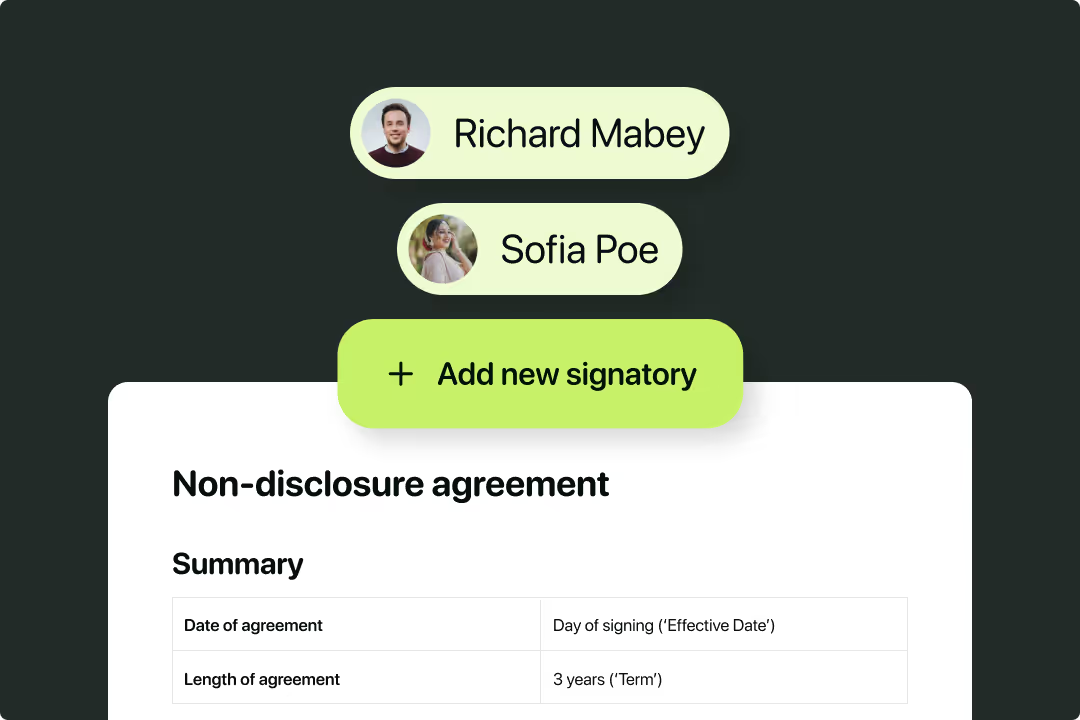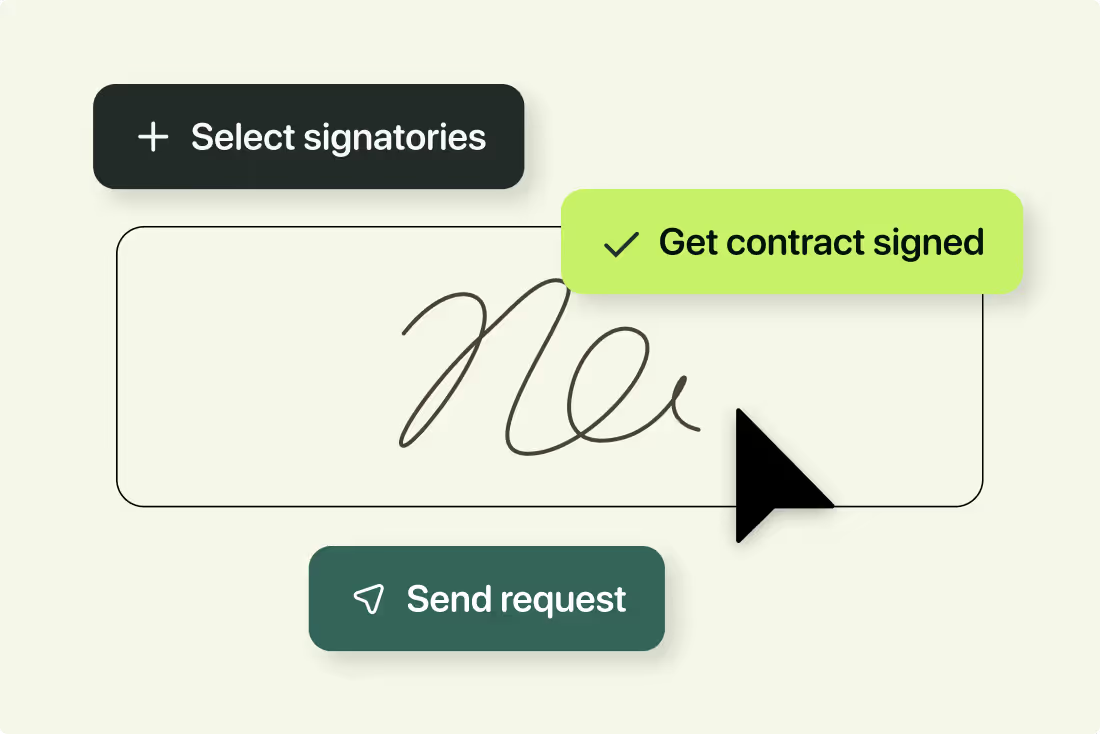Solutions
Customer Support
Resources
Varying a contract allows parties to revise the terms they’d originally agreed to in their contract, without needing to create a new one.
But what is a contact variation, and how does it work? Find out in this Juro explainer.
Contract variation is what happens when parties decide to perform part of a contract differently from the way they’d originally agreed in the document.
Varying a contract allows legal and business teams to change certain terms or obligations later down the line, without needing to scrap or redraft the entire contract. This process is also known as amending a contract.

Contract variations are typically used in situations where the circumstances have changed since the original contract was signed. As a result of this change in circumstances, the terms that previously worked for both parties no longer do.
This could be because the needs of the parties have changed over time. For example, if a party realizes they need a product they’d ordered to be delivered a few weeks earlier than initially agreed, the contract could be varied to move the delivery date in exchange for more money.
Contract variations can also be used to update an employment contract, for example. In fact, it’s common for employment contracts to include a variation clause permitting the employer to make small changes to the employment contract with written notice.
Contract variations sound fairly straightforward so far, right? Well, there are a few important rules surrounding how and when you can vary a contract to make sure it’s legal. Let’s run through these requirements now.
There are three main ways that a contract can be varied: in writing, orally, and through conduct. Let’s explore each of these methods in more detail.

Firstly, a contract variation can be formed in writing. This means that the parties have drafted and signed a formal variation agreement, or have expressed their wishes to vary the contract clearly in another way, such as an email thread.
This is the most common and reliable way to vary a contract since certain types of contracts can only be varied in writing, depending on the jurisdiction and the relevant law.
In fact, most contract variations are agreed using contract variation letters, which are used to show that both parties have agreed to vary the contract. Since this agreement is in writing, parties have something to fall back on if a disagreement occurs.
Many contracts can also be varied orally. This means that they can be varied by agreeing on the change over the phone, or during an in-person meeting. This method is fairly self-explanatory and is probably the easiest way to vary a contract.
But the only problem with this is that it becomes difficult to prove that the parties both agreed on the variation if a contractual dispute occurs. This is because most conversations aren’t witnessed or recorded.
Lastly, you can vary a contract through conduct. This is where parties behave in a way that clearly shows that they’ve mutually agreed to vary the contract. In other words, the parties have to act in a way that shows that they’re no longer following the term in the original contract and that they’re following the contract variation instead.
Again, this can be difficult to prove, which is why it’s always better to create a contract variation in writing.
There are also a few other things to consider when varying a contract. Otherwise, you risk the contract variation not being legally binding. A contract variation also needs to meet the following criteria in order to be valid.
The first rule is a fairly obvious one: all parties must mutually agree to modify the existing contract. This mutual agreement can happen through one of the three ways listed above.
This requirement makes sense because the original party was signed and executed by all parties, so any changes should also be agreed to by all parties.
There are some exceptions to this rule, though. For example, some contracts will include a variation clause that permits one party to make certain changes to the existing contract. This is called a unilateral right to vary the contract. However, these aren’t very common, and there are often lots of restrictions on exactly what can be varied within the contract.
If there isn’t a variation clause allowing this, you should just assume that all parties need to mutually agree to a contract variation in order for it to be valid.

Parties must also intend for the contract variation to permanently affect their rights. This means that a contract variation won’t be recognized if the parties only intend to change part of the contract temporarily.
This is because a variation is used to update a contract so will apply for the rest of the contract’s duration.
A contract variation will also need to comply with all of the requirements set out in both the contract and legislation.
Some business contracts will include a clause about varying the contract. Usually, this will outline which type of variations can be made, when they can be made, and who needs to consent to the variation. If the contract does express these requirements, the parties will be expected to stick to them and only vary a contract according to what they’d previously agreed.
You also need to look at what the law in your jurisdiction says about contract variations.
For example, the law in certain jurisdictions says that certain contracts can only be varied by deed (using a Deed of Variation template). Similarly, UK legislation such as the Contracts (Rights of Third Parties) Act 1999 also says that contracting parties may need the third party’s consent to vary a contract.
Importantly, the rules often vary depending on the nature of the contract, so it’s always worth consulting a lawyer or attorney to make sure your variation is legal.
Finally, a contract variation will require consideration, which essentially means that something of value is exchanged as part of the variation.
For example, if the contract is varied so that goods will be delivered to a party earlier than planned, the other party will usually pay an increased fee for this early delivery. This fee would be a form of consideration.
If consideration isn’t provided, the contract variation will need to be captured in a deed, rather than orally or through conduct.
The whole point of a contract variation is that it allows parties to change part of a contract without having to rewrite it entirely.
This means that, if a ‘variation’ is so substantial that it undermines the original purpose of the contract, it probably won’t be treated as a variation by the court. Instead, the court will consider the original contract to have been terminated and replaced by the new agreement.
With that in mind, how do you know whether to vary your contract or replace it altogether? Let’s find out.

A contract variation is used to amend an existing contract, meaning the original contract continues but with some slight modifications. Terminating a contract, on the other hand, involves scrapping your existing contract altogether.
When deciding whether to draft a new contract or amend the old one, it’s important to consider how significant the amendment will be, and whether it affects the purpose of the original contract altogether.
If it does, it might be worth discharging the contract and creating a new one.
But if it doesn’t, using a contract variation is a better option. After all, creating contracts can be time-consuming. Anything you can do to prevent this double work is a win.
If you want to find out more about how to vary a contract, check out this guide to contract amendments. We also have an employment contract amendment template that’s free to download. But if you want to brush up on your contract management skills, check out these best practices for contract management and contract management courses.

Generally speaking, you do not need to use a deed to vary a contract. However, there are some exceptions to this rule. For example, you will need to vary a contract using a deed if there is no consideration provided, or if the contract you’re trying to vary is of a certain nature.
A contract variation is not a new contract. Instead, it is an update to the existing contract, which means there’s no need to create a new contract altogether.
A contract variation letter is a type of legal document used to outline the agreed changes to the existing contract and confirm that the contract has been varied.
A variation clause is a clause within a contract that discusses the rules around how and when a contract can be varied - if at all. This variation clause will determine what happens if parties do eventually decide to vary their original contract, as it sets out expectations for how this would work.
It is possible to vary a contract if it doesn’t include a variation clause. But the general rule is that all parties must agree to the variation.
Lorem ipsum dolor sit amet, consectetur adipiscing elit. Suspendisse varius enim in eros elementum tristique. Duis cursus, mi quis viverra ornare, eros dolor interdum nulla, ut commodo diam libero vitae erat. Aenean faucibus nibh et justo cursus id rutrum lorem imperdiet. Nunc ut sem vitae risus tristique posuere.

